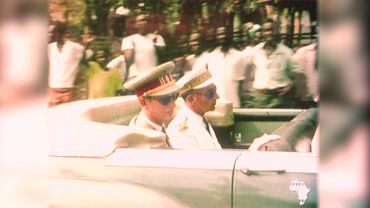The death of Georges Floyd has aroused strong emotions in recent weeks, ranging from demonstrations against racism around the world, to the debunking of statues of King Leopold II in our country. Our former sovereign is causing more controversy today than ever. The Congo was his personal property before becoming, a national colony 1908 to 1960. Do the kings of the Belgians who succeeded Leopold II have a responsibility for this colonial past?
►►► Also read : Should King Philippe apologize for Leopold II? Arguments for and against
Whether Belgian or Congolese, historians are for the most part unanimous on one point: the looting of natural resources and the atrocities inflicted on the Congolese population were one of the worst periods experienced by the African continent. They also agree on the need to contextualize historical facts and the mentalities of the time.
Before the atrocities inflicted by Western states, violence and human trafficking were commonplace among Africans themselves, and also dictated by Arabs. The independent state of the Congo, owned by Léopold II, was the scene of horrors. Faced with this historical reality, a question arises: has the royal line been registered in his footsteps?
Between indignation and wonder
Albert I, then prince at the time, notably went to the Congo in 1909. “In his travel diaries, we can read his indignation at the way we treat the Congolese population. But he is also amazed by the economic development taking place in the Congo“explains Patricia Van Schylenbergh, historian at the Africa Museum.
–

3 images
–
–
In 1908, the Belgian Congo officially became a national colony. The government now manages the exploitation of the country’s natural resources. Albert 1er, Léopold III, and Baudouin still had a certain influence linked to the legacy of Léopold II. “The kings were mixed between two types of values: those which they wanted to see imported into Congo like the progress of medicine, science or even social progress. On the other hand, economic exploitation was necessary to guarantee ‘supposedly’ the well-being of the population “, says the historian.
–

3 images
–
–
“The crown guaranteed the colonial system to the end”
For most historians, these kings were struck by the working conditions and they also invested themselves to improve the life of the population. But keeping workers healthy also allows them to work longer, and to perform more difficult tasks like extracting ores, for example.
Elikia M’Bokolo, historian at the University of Kinshasa, explains that “When the famous ‘big companies’ were created in 1906, the crown was involved in forced labor. It will remain so until the aftermath of the Second World War. The crown won, and it did nothing to change things. She therefore guaranteed the colonial system to the end“.
“Necessary excuses”
Historians and political scientists evoke the moral responsibility of the kings who succeeded Leopold II. These elements have provoked the current debate on possible excuses from King Philipe. For Bob Kabamba, professor of political science at the University of Liège, “these excuses are necessary but they must be made both on the Belgian side and on the Congolese side. These two dynamics can lead to King Philippe’s apologies.“, he concludes.
Read also : A statue of Leopold II unbolted last night in Auderghem: how do activists justify their action? (video)
Today, the debate on royal apologies is much talked about and it is as complex as the history of the Congo and our colonial past.
–
Topic from the June 14 news
–


